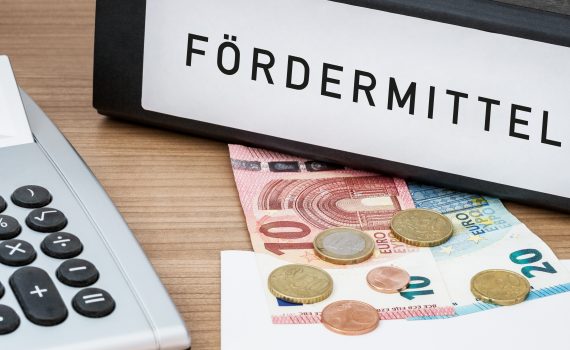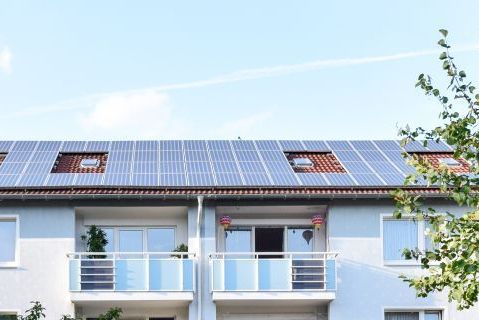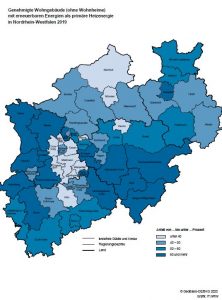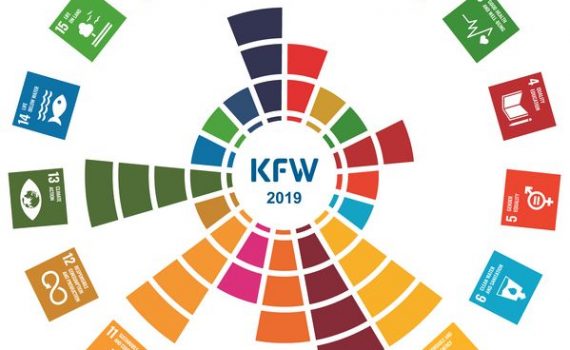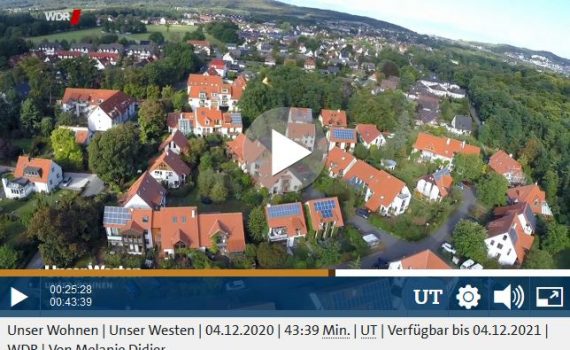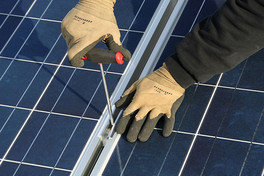 "To be climate neutral by 2050, we not only need to make additional investments in green and innovative technologies of the future. Above all, we also need a shift from existing investments in 'brown' raw materials such as coal, oil and gas to 'green' climate-friendly technologies. The phase-out of fossil fuels must be global and rapid, in line with the goals of the World Climate Conference. Only in this way can we realistically achieve the climate protection goals. Churches, municipalities and also companies are setting new standards here and demonstrating the feasibility of the changeover in both ecological and economic terms," said Environment Minister Ulrike Höfken today at the event "Divestment and Sustainable Finance", which took place during the Climate Protection Weeks in Rhineland-Palatinate.
"To be climate neutral by 2050, we not only need to make additional investments in green and innovative technologies of the future. Above all, we also need a shift from existing investments in 'brown' raw materials such as coal, oil and gas to 'green' climate-friendly technologies. The phase-out of fossil fuels must be global and rapid, in line with the goals of the World Climate Conference. Only in this way can we realistically achieve the climate protection goals. Churches, municipalities and also companies are setting new standards here and demonstrating the feasibility of the changeover in both ecological and economic terms," said Environment Minister Ulrike Höfken today at the event "Divestment and Sustainable Finance", which took place during the Climate Protection Weeks in Rhineland-Palatinate.
Kategorie für Blog: Renewable
 Since April 2020, the Öko-Institut has been conducting research into how urban neighbourhoods can be sustainably transformed, using two neighbourhoods in the swarming city of Darmstadt as examples, in the project Transformative Strategies for Integrated Neighbourhood Development (TRASIQ 2). The Federal Ministry of Education and Research is funding the project, which is led by the Öko-Institut and involves the City of Darmstadt, the Institute for Regional and Urban Development Research (ILS) and the "Team Ewen" agency.
Since April 2020, the Öko-Institut has been conducting research into how urban neighbourhoods can be sustainably transformed, using two neighbourhoods in the swarming city of Darmstadt as examples, in the project Transformative Strategies for Integrated Neighbourhood Development (TRASIQ 2). The Federal Ministry of Education and Research is funding the project, which is led by the Öko-Institut and involves the City of Darmstadt, the Institute for Regional and Urban Development Research (ILS) and the "Team Ewen" agency.
Mobility, heat and living space
The project focuses on the research topics of mobility, heat supply and efficient use of living space. Heat supply is an important key to climate-friendly living. How and where, for example, can district heating be expanded in existing properties? How can we increase the share of renewable energies in the heat supply? The size of the living space also contributes to how environmentally friendly a person lives. What needs to be done to ensure that people have the living space they need in their particular phase of life through intelligent apartment swaps? How can neighbourhoods be redesigned so that residents can organise their mobility ecologically? Wohnungsbaugenossenschaft Neues Berlin and Berliner Stadtwerke have agreed on another joint tenant power project. Six solar power systems with an output of around 500 kilowatts are being built in the Mühlengrund housing estate in Hohenschönhausen. Tenants of more than 1,100 apartments will soon be able to benefit from green electricity from their own roofs.
Wohnungsbaugenossenschaft Neues Berlin and Berliner Stadtwerke have agreed on another joint tenant power project. Six solar power systems with an output of around 500 kilowatts are being built in the Mühlengrund housing estate in Hohenschönhausen. Tenants of more than 1,100 apartments will soon be able to benefit from green electricity from their own roofs.
 From 1 January 2021, climate-damaging fossil fuels will be subject to a price of 25 euros per tonne of CO2 is proven. This means that oil and diesel will become more expensive by 7.9 cents per litre, petrol by 7 cents per litre and natural gas by 0.6 cents per kilowatt hour. Citizens will be relieved of the additional costs, among other things, by a reduction in the price of electricity. The amendment, which had already been passed by the Bundestag on Thursday, also passed the Bundesrat today. The Fuel Emission Trading Act (BEHG) is designed to reduce CO2-price in the form of national certificate trading for the heating and transport sectors.
From 1 January 2021, climate-damaging fossil fuels will be subject to a price of 25 euros per tonne of CO2 is proven. This means that oil and diesel will become more expensive by 7.9 cents per litre, petrol by 7 cents per litre and natural gas by 0.6 cents per kilowatt hour. Citizens will be relieved of the additional costs, among other things, by a reduction in the price of electricity. The amendment, which had already been passed by the Bundestag on Thursday, also passed the Bundesrat today. The Fuel Emission Trading Act (BEHG) is designed to reduce CO2-price in the form of national certificate trading for the heating and transport sectors.
 Glaciers are melting, sea levels are rising, heat waves and heavy rainfall are increasing: The consequences of climate change are visible and tangible worldwide, and the window of opportunity to act is shrinking. In order to significantly limit the global effects of climate change, the emission of greenhouse gases on earth must be drastically reduced. The agreement reached by the international community in Paris in 2015 sets the goal of limiting global warming to well below 2 degrees Celsius, but preferably to 1.5 degrees Celsius. Now, the Wuppertal Institute presented a study with possible cornerstones that can help to achieve the 1.5 degree target by 2035. The study shows that a climate-neutral energy system by 2035 is very ambitious, but in principle feasible, provided that all possible strategies from today's perspective are bundled. This requires, above all, bringing forward and intensifying measures that are described in many studies as necessary to achieve greenhouse gas neutrality by 2050.
Glaciers are melting, sea levels are rising, heat waves and heavy rainfall are increasing: The consequences of climate change are visible and tangible worldwide, and the window of opportunity to act is shrinking. In order to significantly limit the global effects of climate change, the emission of greenhouse gases on earth must be drastically reduced. The agreement reached by the international community in Paris in 2015 sets the goal of limiting global warming to well below 2 degrees Celsius, but preferably to 1.5 degrees Celsius. Now, the Wuppertal Institute presented a study with possible cornerstones that can help to achieve the 1.5 degree target by 2035. The study shows that a climate-neutral energy system by 2035 is very ambitious, but in principle feasible, provided that all possible strategies from today's perspective are bundled. This requires, above all, bringing forward and intensifying measures that are described in many studies as necessary to achieve greenhouse gas neutrality by 2050.
 Solarserver reports on the world's largest solar heating plant, which has been in operation in China since 2016. It consists of parabolic trough collectors.
On the roof of a XuChen factory building next to the company headquarters are 22,000 m2 collector area, a further 71,000 m2 collector area are implemented as ground-mounted systems. Together they deliver an output of 65 MWth. With concentrating collectors, it would thus be the largest solar heating plant of its kind. An even larger one is the Danish Silkeborg plant (110 MWth)which, however, is equipped with a different collector technology.
For comparison: the largest German solar thermal system that supplies a settlement, neighbourhood or district currently has just 14,800 m²
Solarserver reports on the world's largest solar heating plant, which has been in operation in China since 2016. It consists of parabolic trough collectors.
On the roof of a XuChen factory building next to the company headquarters are 22,000 m2 collector area, a further 71,000 m2 collector area are implemented as ground-mounted systems. Together they deliver an output of 65 MWth. With concentrating collectors, it would thus be the largest solar heating plant of its kind. An even larger one is the Danish Silkeborg plant (110 MWth)which, however, is equipped with a different collector technology.
For comparison: the largest German solar thermal system that supplies a settlement, neighbourhood or district currently has just 14,800 m²
 Hydrogen is an important alternative for sectors stuck in the fossil fuel economy. As national governments and European parliamentarians negotiate the EU's hydrogen strategy, EASAC issues a new commentary. "Hydrogen can help reduce our dependence on fossil fuels," says William Gillett, Director of EASAC's Energy Programme. "But the climate benefits are limited if we use fossil fuels to produce it - even with carbon capture and storage. The EU must put an end to fossil fuel subsidies. The rapidly growing demand for hydrogen must be met by a massive increase in electricity generation from renewables, together with certified imports from third countries."
Hydrogen is an important alternative for sectors stuck in the fossil fuel economy. As national governments and European parliamentarians negotiate the EU's hydrogen strategy, EASAC issues a new commentary. "Hydrogen can help reduce our dependence on fossil fuels," says William Gillett, Director of EASAC's Energy Programme. "But the climate benefits are limited if we use fossil fuels to produce it - even with carbon capture and storage. The EU must put an end to fossil fuel subsidies. The rapidly growing demand for hydrogen must be met by a massive increase in electricity generation from renewables, together with certified imports from third countries."
 "Solar energy is a fundamental pillar of the energy transition. In order to further support this and to achieve our goal - a complete power supply from renewable energies by 2030 - we are further expanding our successful solar offensive: In addition to expanding the solar storage programme, which is in high demand, we are currently developing a solar register for Rhineland-Palatinate. In addition, we will also promote solar carports, balcony plug-in modules, wall boxes or agro-PV projects in the future," announced Environment and Energy Minister Ulrike Höfken during the event under the motto "Solar Offensive Rhineland-Palatinate: Investments for Climate and Economy" as part of the series "Wednesdays in the MUEEF" in Mainz today.
"Solar energy is a fundamental pillar of the energy transition. In order to further support this and to achieve our goal - a complete power supply from renewable energies by 2030 - we are further expanding our successful solar offensive: In addition to expanding the solar storage programme, which is in high demand, we are currently developing a solar register for Rhineland-Palatinate. In addition, we will also promote solar carports, balcony plug-in modules, wall boxes or agro-PV projects in the future," announced Environment and Energy Minister Ulrike Höfken during the event under the motto "Solar Offensive Rhineland-Palatinate: Investments for Climate and Economy" as part of the series "Wednesdays in the MUEEF" in Mainz today.
Offensive for green electricity: Installation of 1,000 new photovoltaic systems and 2,000 charging points in Deutsche Wohnen neighbourhoods
"The building sector is responsible for around one third of all CO2-emissions in Germany. To achieve a climate-neutral building stock by 2050, the energy refurbishment of existing buildings alone is not enough," explains Michael Zahn, CEO of Deutsche Wohnen SE. "We also need to exploit the technological possibilities for CO2-Reduction to the fullest and open up the opportunity for our tenants to live sustainably." As stated by EU Commission President Ursula von der Leyen in her State of the Union address announced, the European Commission today (Thursday) proposed that EU greenhouse gas emissions should fall by at least 55 percent by 2030 compared to 1990 levels. The previous target was 40 percent. The new target is based on a comprehensive impact assessment of the social, economic and environmental consequences. This shows that 55 percent less emissions is realistic and feasible. The new climate target will help support Europe's economic recovery from the coronavirus pandemic. It also demonstrates the EU's global leadership in the run-up to the next UN climate conference (COP26).
As stated by EU Commission President Ursula von der Leyen in her State of the Union address announced, the European Commission today (Thursday) proposed that EU greenhouse gas emissions should fall by at least 55 percent by 2030 compared to 1990 levels. The previous target was 40 percent. The new target is based on a comprehensive impact assessment of the social, economic and environmental consequences. This shows that 55 percent less emissions is realistic and feasible. The new climate target will help support Europe's economic recovery from the coronavirus pandemic. It also demonstrates the EU's global leadership in the run-up to the next UN climate conference (COP26).
CO2-Emissions should be reduced by 65 percent over the next ten years compared to 1990 in order to achieve climate neutrality - Energy system must be converted to 100 percent renewable energies by 2040 - Investment of 3,000 billion euros required to meet European Green Deal and Paris climate targets - German EU Council Presidency can ensure that Corona aid packages link economic stimulus with climate protection
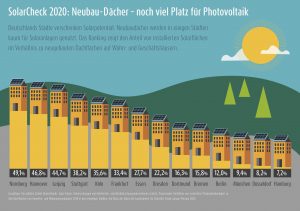 Good news for the PV industry: The solar cap will be abolished and solar expansion will be further promoted. The photovoltaic potential in Germany is enormous - especially when it comes to using roof space on new buildings. The new LichtBlick SolarCheck now shows in detail how well the 14 largest German cities are currently exploiting this potential. Enormous differences are revealed: While Nuremberg (49.1%) and Hanover (46.8%) exploit almost half of their potential, Munich and Düsseldorf do not even reach the 10 percent hurdle. The absolute taillight: the Hanseatic city of Hamburg with only 7.2 percent - one more reason for the solar obligation for new buildings planned by the mayor's office.
Good news for the PV industry: The solar cap will be abolished and solar expansion will be further promoted. The photovoltaic potential in Germany is enormous - especially when it comes to using roof space on new buildings. The new LichtBlick SolarCheck now shows in detail how well the 14 largest German cities are currently exploiting this potential. Enormous differences are revealed: While Nuremberg (49.1%) and Hanover (46.8%) exploit almost half of their potential, Munich and Düsseldorf do not even reach the 10 percent hurdle. The absolute taillight: the Hanseatic city of Hamburg with only 7.2 percent - one more reason for the solar obligation for new buildings planned by the mayor's office.
The parliament of Bremen wants to oblige the use of solar energy on all new and existing buildings in Bremen and Bremerhaven. Whenever the roof surface is completely renewed, they are to be equipped with a solar system in the future. This is photovoltaics and, if necessary, also solar thermal energy. The Senate is currently examining the latter.
State government launches climate protection support programme for citizens
Environment Minister Jan Philipp Albrecht today presented the state's new funding programme for private investment in climate protection. It starts on Tuesday, 9 June, and includes a bundle of support measures. Funding is available for the purchase of cargo bikes, e-charging stations, electricity storage systems, photovoltaic balcony systems, solar thermal systems, non-fossil heating systems and rainwater cisterns. The installation of a district heating connection and the installation of a green roof are also subsidised. The Federal Chamber of Architects (BAK) and the Federal Foundation of Baukultur presented their proposal for a "Baukultur Innovation Programme" to politicians in Berlin today on behalf of the planning and construction industry.
Anne Katrin Bohle, State Secretary at the Federal Ministry of the Interior, Building and Community, accepted the four-point plan. In it, the authors suggest measures to overcome the coronavirus crisis that will have a lasting economic and social impact.
The Federal Chamber of Architects (BAK) and the Federal Foundation of Baukultur presented their proposal for a "Baukultur Innovation Programme" to politicians in Berlin today on behalf of the planning and construction industry.
Anne Katrin Bohle, State Secretary at the Federal Ministry of the Interior, Building and Community, accepted the four-point plan. In it, the authors suggest measures to overcome the coronavirus crisis that will have a lasting economic and social impact.
 Environment Minister Franz Untersteller reacted with relief to the agreement reached yesterday by the coalition on the amendment of the Climate Protection Act. The law is to be passed by the state parliament before the summer break and will then replace the previous climate protection law from 2013.
Environment Minister Franz Untersteller reacted with relief to the agreement reached yesterday by the coalition on the amendment of the Climate Protection Act. The law is to be passed by the state parliament before the summer break and will then replace the previous climate protection law from 2013.
 Berlin/Cologne. Climate protection and adaptation to the consequences of climate change will become increasingly important for cities. This is one of the findings of the survey of (Lord) Mayors of large German cities* conducted by the German Institute of Urban Affairs in January and February 2020. Almost two-thirds of the respondents named climate protection as an important municipal issue for the future. This means that the number of mayors who attribute an increase in importance to this field of municipal policy action has more than tripled compared to the previous year. Future surveys will show how strongly this result was influenced by the protests of the 'Fridays for Future' movement.
Berlin/Cologne. Climate protection and adaptation to the consequences of climate change will become increasingly important for cities. This is one of the findings of the survey of (Lord) Mayors of large German cities* conducted by the German Institute of Urban Affairs in January and February 2020. Almost two-thirds of the respondents named climate protection as an important municipal issue for the future. This means that the number of mayors who attribute an increase in importance to this field of municipal policy action has more than tripled compared to the previous year. Future surveys will show how strongly this result was influenced by the protests of the 'Fridays for Future' movement.
The use of solar energy is an important pillar in the energy mix of the future and for the concrete implementation of the energy transition. At the end of 2019, around 1.8 million solar power systems with an output of 49,873 megawatt peak (MWp) were installed across Germany. With around 45 billion kWh of climate-friendly electricity, these accounted for a share of just under eight percent of German electricity generation. This amount is mathematically sufficient to supply 12.8 million households with electrical energy for a year. The approximately 280,000 turbines installed in NRW had an output of around 5,300 megawatt peak.
 Brussels/Freiburg, 5 May 2020 - An alliance "Solar Europe Now", officially launched on 5 May, is calling for solar energy to be recognised as a key technology for the objectives of the European Green Deal. The new alliance, which currently includes more than 90 players from the entire value chain of the European solar industry, is concerned that the photovoltaic sector is not being given enough consideration in the current presentation of the Green Deal.
Brussels/Freiburg, 5 May 2020 - An alliance "Solar Europe Now", officially launched on 5 May, is calling for solar energy to be recognised as a key technology for the objectives of the European Green Deal. The new alliance, which currently includes more than 90 players from the entire value chain of the European solar industry, is concerned that the photovoltaic sector is not being given enough consideration in the current presentation of the Green Deal.
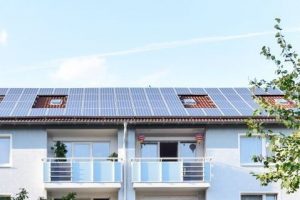 In Vienna, as a rule, no residential building may be erected without a solar system in the future. This is stipulated in an amendment to the building code, which is currently being evaluated, the red-green city government informed on Monday. Currently, such a photovoltaic obligation applies only to industrial buildings.
In Vienna, as a rule, no residential building may be erected without a solar system in the future. This is stipulated in an amendment to the building code, which is currently being evaluated, the red-green city government informed on Monday. Currently, such a photovoltaic obligation applies only to industrial buildings.
 Hydrogen from hydropower: successful start for one of the largest power-to-gas plants in Germany to date. This is reported by the Centre for Solar Energy and Hydrogen Research Baden-Württemberg (ZSW). The megawatt plant has been in operation for four months in April 2020 and is functioning reliably. A research electrolyser connected to it is also running successfully. The ZSW is coordinating the project. The operator of the commercial plant is the energy supplier Energiedienst AG.
Hydrogen from hydropower: successful start for one of the largest power-to-gas plants in Germany to date. This is reported by the Centre for Solar Energy and Hydrogen Research Baden-Württemberg (ZSW). The megawatt plant has been in operation for four months in April 2020 and is functioning reliably. A research electrolyser connected to it is also running successfully. The ZSW is coordinating the project. The operator of the commercial plant is the energy supplier Energiedienst AG.
 In research, neighbourhoods have been recognised as an important level of action for climate protection. For this reason, the BMBF, BMU and the Federal Ministry of Building and Transport have funded several research projects on sustainable neighbourhoods, which are now being worked on. The consensus of the research projects presented and the funding bodies is that it is important to research neighbourhood concepts for a climate-friendly heat and electricity supply as well as an environmentally friendly mobility offer in an economical way" and "to link the individual elements in the sense of a functioning sector coupling in a meaningful way."
The focus articles in the "Ecological Economy 3/2019" issue highlight the potential of the neighbourhood approach for the implementation of climate protection measures, but also present best practice examples and discuss feasibility in practice.
In research, neighbourhoods have been recognised as an important level of action for climate protection. For this reason, the BMBF, BMU and the Federal Ministry of Building and Transport have funded several research projects on sustainable neighbourhoods, which are now being worked on. The consensus of the research projects presented and the funding bodies is that it is important to research neighbourhood concepts for a climate-friendly heat and electricity supply as well as an environmentally friendly mobility offer in an economical way" and "to link the individual elements in the sense of a functioning sector coupling in a meaningful way."
The focus articles in the "Ecological Economy 3/2019" issue highlight the potential of the neighbourhood approach for the implementation of climate protection measures, but also present best practice examples and discuss feasibility in practice.
 From the meeting of the Senate on 10 March 2020:
The Senate today adopted a comprehensive catalogue of measures to accelerate the expansion of solar energy in Berlin, following a proposal by the Senator for Economics, Energy and Public Enterprises, Ramona Pop.
Senator Pop: "The potential study for the Solarcity Masterplan has shown that we can harvest 25 per cent of the electricity generated with solar energy from Berlin's rooftops. We must therefore accelerate the expansion of solar energy in the city. It is necessary for the federal government to finally improve the legal framework for solar energy in cities. Nevertheless, we want to actively utilise the available scope at state level. With the Solarcity Masterplan, we will expand information and advice, provide incentives and also examine regulatory instruments. The implementation of the Solarcity Masterplan is a joint task for the Senate, but also for all Berlin stakeholders from business and society."
From the meeting of the Senate on 10 March 2020:
The Senate today adopted a comprehensive catalogue of measures to accelerate the expansion of solar energy in Berlin, following a proposal by the Senator for Economics, Energy and Public Enterprises, Ramona Pop.
Senator Pop: "The potential study for the Solarcity Masterplan has shown that we can harvest 25 per cent of the electricity generated with solar energy from Berlin's rooftops. We must therefore accelerate the expansion of solar energy in the city. It is necessary for the federal government to finally improve the legal framework for solar energy in cities. Nevertheless, we want to actively utilise the available scope at state level. With the Solarcity Masterplan, we will expand information and advice, provide incentives and also examine regulatory instruments. The implementation of the Solarcity Masterplan is a joint task for the Senate, but also for all Berlin stakeholders from business and society."
- Over EUR 28 billion for "climate protection measures": KfW is one of the most important supporters of the Paris climate goals
- Promotional bank is a global pioneer with its standardised SDG mapping
- Strong international interest in KfW SDG mapping
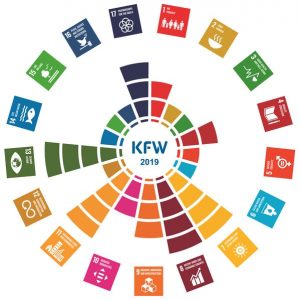 KfW is today publishing the results of the SDG mapping of new commitments throughout the Group in 2019. In order to clarify the individual contribution made by KfW's new commitments to achieving the UN Sustainable Development Goals, KfW has developed a standardised procedure: 1,500 indicators are used each year to determine to which SDGs KfW's new commitments can be assigned. This makes the contribution transparent at both group and business sector level.
KfW is today publishing the results of the SDG mapping of new commitments throughout the Group in 2019. In order to clarify the individual contribution made by KfW's new commitments to achieving the UN Sustainable Development Goals, KfW has developed a standardised procedure: 1,500 indicators are used each year to determine to which SDGs KfW's new commitments can be assigned. This makes the contribution transparent at both group and business sector level. [su_spacer]
The documentary features a 5-minute sequence about the Waldquelle ecological housing estate in Bielefeld. Ute Möller, one of the founders, gives a tour of the eco-settlement and talks about the experiences and developments in the now almost 25-year-old settlement with lots of wood, greenery and solar cells on the roof.
[su_spacer]
The documentary features a 5-minute sequence about the Waldquelle ecological housing estate in Bielefeld. Ute Möller, one of the founders, gives a tour of the eco-settlement and talks about the experiences and developments in the now almost 25-year-old settlement with lots of wood, greenery and solar cells on the roof.
Climate protection has long been one of the most urgent topics for the housing industry. In order to achieve a climate-neutral building stock by 2050, the 24 founding companies of the Wohnen.2050 initiative met in Berlin on 28 January 2020 to found the association. The nationwide association was initiated by the Nassauische Heimstätte | Wohnstadt group of companies.
 "Don't just talk about climate change, act" - under this motto, the Nassauische Heimstätte | Wohnstadt Group invited founding partners from all over Germany to found the Initiative Wohnen.2050 (IW2050) association. The overarching objective is a climate policy alliance, which, in addition to strategic cooperation and a technical and content-related comparison, primarily focuses on economic and financial concerns to achieve the targets.
"Don't just talk about climate change, act" - under this motto, the Nassauische Heimstätte | Wohnstadt Group invited founding partners from all over Germany to found the Initiative Wohnen.2050 (IW2050) association. The overarching objective is a climate policy alliance, which, in addition to strategic cooperation and a technical and content-related comparison, primarily focuses on economic and financial concerns to achieve the targets.
Thuringia is making six million euros available this year for investments in municipal climate protection. The funding comes from the state's "Klima Invest" programme, which has already provided more than 15.5 million euros in investments in municipalities since the beginning of 2018, as the Ministry of the Environment announced in Erfurt on Thursday. 312 applications for funding have been approved.
This week, the German cabinet plans to adopt the draft bill on the coal phase-out law. However, the roadmap for the shutdown of coal-fired power plants that is to be voted on deviates in several places from the coal compromise reached last year. The Solar Cluster Baden-Württemberg points this out and demands considerable improvements. According to the draft law, carbon dioxide emissions will be reduced significantly less than agreed in the first ten years: By 2030, only five gigawatts instead of 20 gigawatts of power are to be switched off. In addition, the number of CO2 allowances will not fall to the same extent as coal-fired power generation.
 The share of renewable energies in electricity consumption rises to almost 43 percent. The climate protection successes in the electricity sector are diminished by rising greenhouse gas emissions in buildings and transport. In parallel, public interest in climate protection is rising: since May 2019, it has consistently been the most pressing political issue in the eyes of the population. This is shown by Agora Energiewende's 2019 annual evaluation.
The share of renewable energies in electricity consumption rises to almost 43 percent. The climate protection successes in the electricity sector are diminished by rising greenhouse gas emissions in buildings and transport. In parallel, public interest in climate protection is rising: since May 2019, it has consistently been the most pressing political issue in the eyes of the population. This is shown by Agora Energiewende's 2019 annual evaluation.
 One of the Herculean tasks to achieve the climate targets is to radically reduce CO2 emissions from the heat supply. A group of researchers led by the Institute for Ecological Economy Research (IÖW) shows how cities can turn away from coal, oil and gas in a socially acceptable way. The project "Urban Heat Turnaround" investigated possible contributions from renewable energies and local heat sources in Berlin's urban neighbourhoods. "Waste heat from businesses, heat from waste water or geothermal energy have hardly been used so far.
One of the Herculean tasks to achieve the climate targets is to radically reduce CO2 emissions from the heat supply. A group of researchers led by the Institute for Ecological Economy Research (IÖW) shows how cities can turn away from coal, oil and gas in a socially acceptable way. The project "Urban Heat Turnaround" investigated possible contributions from renewable energies and local heat sources in Berlin's urban neighbourhoods. "Waste heat from businesses, heat from waste water or geothermal energy have hardly been used so far.
 ROBIN WOOD has scrutinized the green electricity offers of 1,200 providers and publishes the results today in the "ROBIN WOOD Eco-Electricity Report 2020.". The environmental organization rates eight offers as recommendable. The current research report was realized with the support of the Open Knowledge Foundation Germany.
ROBIN WOOD has scrutinized the green electricity offers of 1,200 providers and publishes the results today in the "ROBIN WOOD Eco-Electricity Report 2020.". The environmental organization rates eight offers as recommendable. The current research report was realized with the support of the Open Knowledge Foundation Germany.
The aim of the EnergiespeicherPLUS programme is to drive forward the expansion of photovoltaics in Berlin and to increase the share of renewable energies in electricity consumption, even in times of low sun and low wind. This benefits climate protection, as CO 2 -emissions can be avoided. The Berlin Energy and Climate Protection Programme provides grants towards the investment costs of electricity storage systems if a photovoltaic system is installed at the same time. The IBB Business Team GmbH is implementing the programme. Since 1 January 2020, an electronic application for funding can now be submitted quickly and easily to the IBB Business Team GmbH under www.energiespeicherplus.de be put.
Shortly after the shutdown of the Swiss old reactor Mühleberg it goes Philippsburg 2 nuclear power plant from the grid on 31.12.2019 as planned. This will be followed in a few months by Fessenheim the two oldest reactors in France. In addition, the 45-year-old nuclear power plant "Ring neck 2" from the grid. Shutting down nuclear reactors significantly reduces the risk of accidents and avoids masses of radioactive nuclear waste and its transport in Castor containers.
Since 17 December 2019, the "Competence Centre for Sustainable Procurement and Contracting" (KNBV) has been supporting municipalities and other public administration bodies in Schleswig-Holstein in taking sustainability into account. In this context, the range of tasks extends from paperless procurement processes and PVC-free office supplies to electric service vehicles including a charging station concept or sustainable services such as plastic-free, fair and regional catering. The KNBV provides advice, information and support for all questions relating to these processes, products or committee and public relations work. Interested municipalities and other public administration bodies will find competent answers for concrete projects as well as a wide range of training courses and events.















